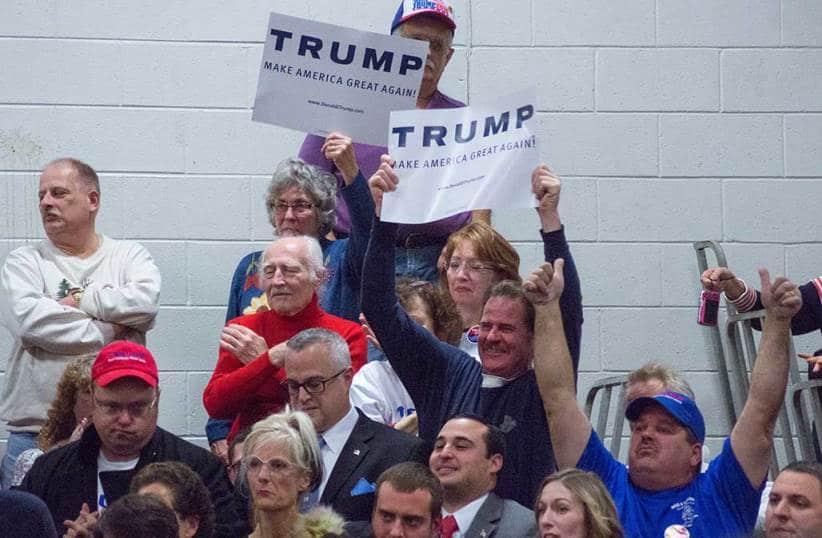Politics
Overturning Fighting Faiths

The seemingly interminable 2016 presidential is finally ending — and all the weather wanes are pointing to a victory for the Democratic Party nominee Hillary Clinton. However, the surprising resilience of Donald Trump, notwithstanding his crass, narcissistic and disastrous campaign, has pointed a searchlight on the profound sense of national unease that is at the bedrock of his support.
Thirty-two years after Ronald Reagan coasted to a landslide victory over Walter Mondale riding his optimistic “Morning in America” campaign slogan, Trump’s dystopian political strategy has pried open every national scab, with an apocalyptic vision of a country overrun by rampant violence, criminal aliens, crumbling infrastructure and mismanaged by confused, feckless leaders.
It is a remarkable and humiliating decline for a seemingly proud and confident nation that strode as a colossal astride the better part of the past century. Somehow, fully a third of the American people seem convinced that the country has been reduced to a Third World colony of faceless globalists and bureaucrats.
The vast majority of Trump’s support comes from less educated Whites, who have conflated their aggrieved circumstances with the hyped up threats of foreigners stealing their jobs, undermining their identity and endangering their security.
Opinion polls show wide disparities on public perceptions of personal finance and security based on income and education. A Pew Center survey found that 75 percent of those with incomes higher than $100,000 believe their family finances are keeping pace or improving with inflation. By contrast, a majority of those with incomes below $75,000, and nearly two thirds of those with income under $30,000, say they are falling behind financially. While two thirds of those with college degrees feel that their economic situation is steady or improving, a majority of those without a college degree say it is declining. 81 percent of Trump’s supporters feel that life in America is worse today than 50 years ago and 68 percent believe that it will be worse for the next generation. In comparison, a majority of Clinton’s supporters believe the opposite.
By all accounts, Donald Trump is a product of the corrupt political and economic system that frustrates and disillusions his followers. A child of privilege, he abused every loophole in the rigged system that he has so effectively inveighed against to not just enrich himself by buying favors with politicians, but also to evade taxes, stiff vendors and businesses by declaring multiple bankruptcies, and even his customers, such as students of the discredited Trump University. Indeed, there could be no better a poster child of the crooked insider system than Trump. He has, of course, brilliantly disarmed that critique by acknowledging it, and asserting, counter intuitively, that his insider experience best positions him to disassemble it.
By publicly threatening to swing a wrecking ball against the rigged system on which he has coasted, Trump has been able to tap into the visceral anger that millions of marginalized Americans feel. They forgive his dishonesty and failures — and they likely don’t even believe that he will transform anything, because for the most part, they are past caring. They want only to stick it to the establishment. And by electing Trump, regardless of what he does, they will have accomplished that.
As the Las Vegas Review Journal, the lone major newspaper to endorse the Republican nominee, wrote: “Mr. Trump represents neither the danger his critics claim nor the magic elixir many of his supporters crave. But he promises to be a source of disruption and discomfort to the privileged, back-scratching political elites for whom the nation’s strength and solvency have become subservient to power’s pursuit and preservation.”
The palpable anger that animates his followers will outlast Trump. Democrats and Republicans alike need to find answers for those who are dislocated by the technological, trade and economic gales that are tearing through traditional industries, jobs and communities. Immigrants, crime and trade deals may be bogeymen for demagogues like Trump, but the distress and dislocation is real.
The answers to the genuine problems of real people rest in an activist, progressive state that is people centric — one that guarantees healthcare, a livable minimum wage, a robust safety net, retraining programs for the new economy, enhanced educational opportunities, etc. Republicans have spent two generations demonizing the government and any attempt to leverage it for public good will be heretical to keepers of the flame.
But there is no other escape. Already, the political sands are shifting. The Democratic Party’s union constituency has traditionally been more hostile to immigration and free trade. Recent surveys, however, show that Democrats are now more favorably disposed on both issues, whereas Republicans have shifted in the opposite direction. In another reversal in the most recent election cycle, the Democratic presidential candidate is far more hawkish on foreign policy than her Republican opponent. Both political parties risk alienation and irrelevancy if they are unable to sever the shackles of dogma and orthodoxy that have outlived their lifespan.
Over the centuries, time and tide have overturned even mightier fighting faiths.

You must be logged in to post a comment Login